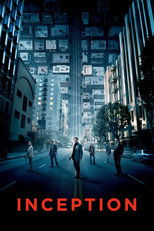ohlalipop
Feb 9, 2017

2010-07-15
Feb 9, 2017
Mar 9, 2019
8/10
Oct 17, 2019
Jan 27, 2020
9/10
Sep 17, 2020
Jul 4, 2023
7/10
Jun 8, 2024
Jul 7, 2024
Christopher Nolan's "Inception" (2010) stands as a testament to the power of original storytelling in modern cinema. This science fiction thriller takes viewers on a mesmerizing journey through the intricate landscapes of the human mind, exploring the nature of reality, dreams, and the subconscious. With its multi-layered narrative and stunning visual effects, "Inception" challenges audiences to question the very fabric of their perception, solidifying Nolan's reputation as one of the most innovative filmmakers of our time.
At its core, "Inception" follows Dom Cobb (Leonardo DiCaprio), a skilled extractor who can infiltrate people's dreams to steal information. Cobb is offered a chance at redemption and a way back to his children through one last job: planting an idea in someone's mind, a process known as inception. This seemingly impossible task involves creating a dream within a dream within a dream, pushing the boundaries of what's possible in both the dream world and filmmaking itself. The intricate plot weaves together elements of heist movies, psychological thrillers, and mind-bending science fiction, creating a narrative tapestry that is as complex as it is captivating.
DiCaprio delivers a powerful performance as the tormented Cobb, haunted by the memory of his wife Mal (Marion Cotillard). The supporting cast, including Joseph Gordon-Levitt, Ellen Page, Tom Hardy, and Cillian Murphy, bring depth and nuance to their roles, each contributing significantly to the film's emotional core and intricate plot mechanics. Cotillard's portrayal of Mal is particularly noteworthy, embodying both allure and danger as a projection of Cobb's guilt-ridden subconscious. The ensemble cast's chemistry and individual performances elevate the film, grounding its high-concept premise in genuine human emotion and conflict.
Nolan's vision is brought to life through stunning cinematography by Wally Pfister and groundbreaking visual effects. The film's most iconic scenes, such as the folding Paris cityscape and the zero-gravity hotel fight, are not merely eye candy but integral parts of the narrative. These visually arresting moments serve to illustrate the malleable nature of the dream world while pushing the boundaries of what's possible in cinema. Hans Zimmer's score complements the visuals perfectly, adding layers of tension and emotion to every scene. The technical prowess displayed in "Inception" sets a new standard for blockbuster filmmaking, seamlessly blending practical effects with CGI to create a world that feels both fantastical and tangible.
Since its release, "Inception" has sparked countless discussions and debates, particularly regarding its ambiguous ending. This open-ended conclusion invites viewers to question the nature of reality and the power of perception, leaving a lasting impact long after the credits roll. The film's influence can be seen in subsequent movies that explore similar themes of reality versus illusion. "Inception" not only entertains but also challenges its audience, encouraging multiple viewings to fully grasp its complexity. It stands as a pinnacle of Nolan's filmography, showcasing his ability to blend high-concept ideas with emotional depth and spectacular action. In the landscape of modern cinema, "Inception" remains a towering achievement, a dream from which many viewers may never want to wake.